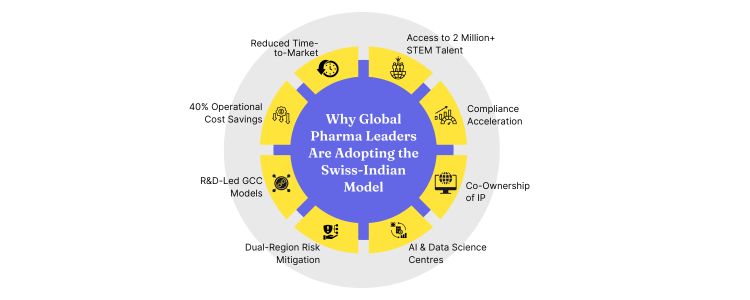The global life science industry is at a significant turn. Pharma companies are no longer looking for just operating assistance; they are looking for a scalable innovation ecosystem. India is fast becoming a digital spine of global pharma operations, with the Pharma GCC (Global Capability Center) industry estimated to reach US $52 billion by 2030.
The pharma innovations by veteran companies such as Roche and Novartis from Switzerland and Europe contribute more than 85 billion Swiss Francs annually to their economy through pharma innovation.
But here is the change: Pharma companies are now taking advantage of Swiss-Indian cooperation models, with Swiss scientific excellence combined with India’s digital talent and economic benefits. This dual-regional innovation approach is helping pharma chiefs to speed up research, adapt tests, and pursue new drug discoveries.
Benefits of India?
Switzerland and India together are strengthening a new pharma innovation network through 40% cost reduction, Stem graduates over 2 million annually, and world-class pharma GCC clusters in Bengaluru, Hyderabad, and Pune.
| Key Factor |
Switzerland |
India |
| Core Focus |
Drug discovery, biotech R&D |
Digital health, AI-driven trials, data science |
| Talent Strength |
Scientists, molecular researchers |
Data scientists, software engineers, trial specialists |
| IP & Regulatory Edge |
Strict IP laws, EMA regulatory frameworks |
Rapid digital regulations, IP partnership models |
| Tech Infrastructure |
Innovation labs, molecular tech hubs |
Digital trial platforms, cloud-based clinical data centers |
| Economic Advantage |
High-value creation through premium innovation |
40% lower operational costs, scalable talent pools |
| Operational Model |
Small-scale, high-end precision labs |
Large-scale digital execution hubs |
| R&D Investments |
20% of GDP towards pharma R&D (2024 estimates) |
$10B digital health investment planned by 2028 |
| Pharma Ecosystem |
Home to Roche, Novartis, and Lonza |
Hub for Pfizer, Sanofi, AstraZeneca, and GSK GCCs |
Roche is one of the world-known firms in the pharmaceutical industry of Switzerland, which sought to extend the time before the clinical testing term without any penalties to the harshness of regulatory practice or reduction of expenses related to operations.
What They Did:
- Set up an AI Digital Testing Execution Center in Hyderabad consisting of 1,500 Indian online specialists.
- Utilising Swiss Research and Development Teams of Clinical Testing Design and Regulatory Advice.
- Enabled real-time data analysis in more than 20 countries from India, processing more than 25 terabytes per week.
- Developed predicted algorithms using Indian AI engineers, which improved patient recruitment by 28% for clinical trials.
- A blockchain-capable data compliance structure was created, ensuring Swiss-level security standards.
Result:
- Clinical tests decreased by 32%.
- 45% reduction in operating costs.
- The Swiss intellectual property standards were maintained, expanding operations in India.
- Joint patents were filed by Swiss-Indian teams, reflecting changes towards co-made innovation.
This success story is now motivating other major pharma companies like Novartis, Sanofi, and AstraZeneca to adopt similar double-regional GCC strategies.
Global Pharma companies no longer see GCC as back-end operations. Instead, Swiss Research and Development (R&D) and India’s digital power are combining innovation and a co-owned, tight GCC ecosystem. This Swiss-Indian blueprint is setting a global standard for life science enterprises prepared for the future.
As a reliable GCC enabler in India, Inducts GCC helps global pharma giants design Swiss-Indian collaborative innovation networks. From digital testing execution to IP cum-making and cloud platform management, we create GCCs that innovate, expand, and lead.
frequently asked questions (FAQs)
1.
What is the Swiss- Indian Pharma GCC model?
This is a model of collaboration between the Swiss Pharma Research and Development Centre and the Department of AI-based tests, Indian Digital GCC into the Drug Search along with innovation.
2.
What is the role of Switzerland Pharma in the GCC model?
Switzerland provides quality research, a regulatory framework, as well as protection of intellectual property and leadership in biotechnology innovations.
3.
What does Pharma GCC do in India?
AI-based clinical tests, data analysis, patient recruitment adaptation, digital twins, and regulatory data management.
4.
How does the Swiss-Indian model reduce clinical testing time?
AI and data science of Indian GCC optimise patient recruitment and real-time testing monitoring, reducing the test cycle to 25–30%.
5.
Do pharma companies in India co-own intellectual property (IP) with GCC Swiss firms?
Yes. Swiss headquarters and Indian GCC often co-develop solutions, promoting joint intellectual property (IP) and shared innovation.
Aditi
Aditi, with a strong background in forensic science and biotechnology, brings an innovative scientific perspective to her work. Her expertise spans research, analytics, and strategic advisory in consulting and GCC environments. She has published numerous research papers and articles. A versatile writer in both technical and creative domains, Aditi excels at translating complex subjects into compelling insights. Which she aligns seamlessly with consulting, advisory domain, and GCC operations. Her ability to bridge science, business, and storytelling positions her as a strategic thinker who can drive data-informed decision-making.



















